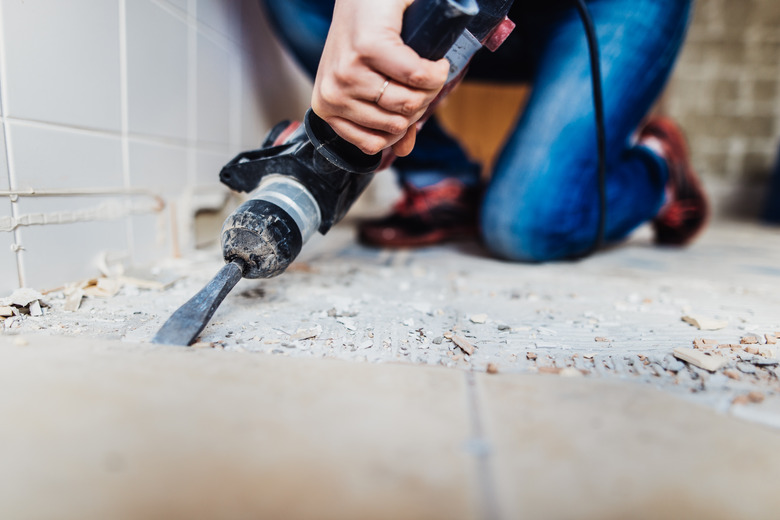How To Interview A Contractor For Big — Or Small — Jobs
The right contractor — whether they are a general contractor, a carpenter, plumber, or an electrician — can make all the difference to a home remodeling project, but finding the right one for your home renovation can be a challenge. Sometimes, finding a contractor feels more about avoiding the bad ones than seeking out the good ones, but there are plenty of good ones to be found. The trick is to ask the right questions and heed the answers.
Sometimes, when you have only a small job to do, it's tempting to try and abbreviate the contractor selection process and just focus on getting the job done. Resist this temptation. Even a small job done badly can look terrible, function poorly, and leave you with regret. Don't shortchange your project. Find a contractor who takes even the smallest job seriously and always strives to do good work.
Ready to hire a contractor for your next home improvement project? Here's what you should ask a potential hire before you sign a contract.
Before the Interviews
Before the Interviews
There are a few things you need to do before you begin interviewing potential contractors, and skipping them can cost you. The first is to decide what you really want. Are you looking at ripping out your bathroom and starting from scratch, or do you just want to reface your kitchen cabinets for a bit of an update? If you're not sure what you want, even the best contractor can't give it to you.
Once you know what you want, ask yourself if you truly need a contractor. If all you want to do is give your kitchen cabinets a facelift, for example, you may be better off choosing a specialist whose primary business is cabinet resurfacing. Small projects are important too, but they're sometimes better served by someone with a niche skill.
It's also important to understand that although a good contractor can do amazing things, reading your mind isn't one of them. The best approach to the job is to begin by picking out some of the materials and finishes you want. This allows you to price and budget for certain fixtures, countertops, backsplashes, shower stalls, and other items. It also allows you to shop for them with professionals in each field so you can fully understand the pros and cons of your choices.
At the very least, find photographs of finished rooms you like and share them with the contractors you interview. This can provide a much more specific look at your personal tastes so your contractor can help steer you in the right direction.
Be prepared to tell your contractor how you want the space to function as well. If you're a passionate baker, tell your contractor so they can help create a kitchen that will work for you. If you want a garage that can house a car but still has room for your woodworking shop, say so. The more your contractor knows, the better they can assist you.
Know and Understand Any HOA Rules
Know and Understand Any HOA Rules
There is a popular saying that claims it's sometimes better to ask for forgiveness than permission. This is not true when it comes to home remodeling and renovations. If you live in a condominium or a neighborhood with a homeowners' association (HOA), you may have to follow special rules. Many dictate how early a construction project can start and how late it can continue. You'll need to know this information and share it with your contractor.
Even when there's no HOA, it's important to investigate the local zoning laws and building code requirements that pertain to your project. A good contractor will know the local rules if not your HOA rules, but you should have a basic idea of the rules as well. If you ignore building codes or run afoul of your HOA, you may need to undo the work you've just had done.
How to Find Good Contractors
How to Find Good Contractors
When you're ready to start the interview process, you'll need to find some local contractors to meet. Try not to approach this task randomly. Begin by talking to friends, family members, and others about general contractors or other types of contractors they've used in the past. People certainly won't be shy about telling you if they didn't like a certain professional. Those who feel they got excellent work also tend to be quite excited when recommending a good candidate.
It's also a good idea to take a scroll through your local Better Business Bureau (BBB) website. Start with contractors who are registered with the BBB and have a good rating. Naturally, you will want to avoid those with a bad rating or lots of complaints. Look at the websites of a few contractors as well. Good general contractors will likely have positive customer reviews on their site along with a photographic portfolio of their work.
Another excellent but often overlooked source of contractor information is the local home improvement store, lumberyard, or trade supplier (such as a plumbing supply house). Contractors buy building materials all the time. The people they buy from know who purchases the best-quality materials and who responsibly pays their bills on time. They may be willing to share the names of some good contractors with you. Real estate agents and landlords also tend to use contractors often and are excellent sources of recommendations.
The General Contractor Interview
The General Contractor Interview
When interviewing a contractor, you will of course cover the basics:
- Are you licensed and insured?
- How much money is due and when?
- How will you resolve conflicts if they happen?
- How long do you expect this job to take?
- What does your payment schedule look like?
Though these are all great and necessary questions, try to dig a little deeper. One way to do so is to ask for references and the location of a current job site. Checking a general contractor's references tells you if previous clients were happy with the finished product, but it shows you nothing about the process of getting there. If you visit a currently active job site, you can see whether the workers are keeping things clean and if they seem respectful of the property.
Verify that the contractor has done a project similar to yours recently. Construction techniques and materials change, so you'll want somebody whose skills are up to date. Some homeowners also like to specifically ask what safety measures a contactor takes on her job sites and how they clean up at the end of the day. Some also prefer a contractor who doesn't allow smoking on the job site.
It's also important to ask who will be in your house. Some general contractors oversee the work daily. Others hire subcontractors and then leave them to work independently. Ideally, you want a general contractor who checks in at the site daily. You also want to have the same work crew on site every day to follow the job from start to finish.
You may wish to ask your contractor if they have ever worked under a different name. If so, knowing that name can help you research any lawsuits, bankruptcies, or customer complaints from the past. Verify too that the contractor will be responsible for securing any required building permits and inspections. Get warranty information as well. You don't want a taillight warranty — one that lasts only as long as you can see the back end of the contractor's truck driving away.
Red Flags to Avoid
Red Flags to Avoid
Though sometimes you can't tell when a professional is going to be difficult to work with or will provide subpar work, you can avoid major mishaps when you hear or see the following red flags in an interview:
- If the contractor isn't licensed, don't hire them.
- If the contractor wants to be paid in full up front or in cash only, run fast.
- If they don't have liability insurance or workers' compensation insurance, that's a huge warning sign.
Sometimes, you can even rule out a contractor before you get to the interview. If they are not returning your calls or willing to make time to meet with you, where will they be when the job is half done? Most likely MIA. Save yourself the hassle of tracking them down later by refusing to hire them now.
You'll also want to immediately reject a contractor who is willing to seal any part of your agreement with a good old-fashioned handshake. It's also best to avoid allowances when you can too, but these aren't necessarily huge red flags on their own.
Allowances are prices your contractor quotes you for items you haven't picked out yet. You may, for example, have yet to decide which kitchen faucet you want. If you don't have a specific one picked out, your contractor may provide you with a cost estimate of the fixture on your bid. Unfortunately, the one you ultimately choose may cost far more than estimated. If an allowance is necessary, try to get a general idea of the cost of the styles and materials you like so your allowance matches the reality as closely as possible.
Getting the Best Job Out of a Contractor
Getting the Best Job Out of a Contractor
Although not part of the interview process, there are little things you can do after you've hired a contractor to make the job go more smoothly. Make sure that kids and pets stay out of the way until the completion date. Roaming pets and kids can cause safety hazards your workers would prefer to avoid.
Ready your home as well. Empty rooms where work is being done and pay attention to adjacent rooms. If a contractor is hanging cabinets on your kitchen wall, take down the pictures hanging on the other side so they don't fall. These little preparations can make the project go much more smoothly for all involved.
Perhaps most importantly, remember to be kind. You should be kind simply because it's the right thing to do, of course, but a little extra niceness can decrease potential conflicts and grease the wheels of your remodel. Greet the work crew in the morning when they come. Let the workers in your house use the bathroom. Bring them a cold bottle of water or lemonade on a hot day. Just generally being likable can make the construction crew feel good and may just encourage them to go the extra mile for you.

